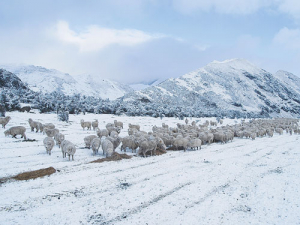Research company UMR ran an anonymous survey, as part of a research project commissioned by Environment Canterbury (ECan), supported by Beef + Lamb NZ and Federated Farmers (South Canterbury).
Interviews were done to understand current hill country development practices, as ECan considers approaches to help farmers determine whether and how to develop their hill country pastures.
Some sheep and beef farmers are improving hill country productivity by planting older hill country pastures with higher producing pasture species. This commonly involves one or more years in winter feed. However, it also creates an increased risk of sediment losses during this period.
Some farmers were found to have already changed their land development practices after previous experience of soil loss. Many are now using direct drilling to establish the pasture or crop and reduce risk of soil loss.
ECan’s manager zone delivery, Paul Hulse, says the interviews also highlighted that many farmers are taking care to avoid or mitigate sediment loss risks through paddock selection, use of direct drilling and excluding erosion-prone land from the development.
“Some farmers expressed concern about the much greater risk of soil loss and soil damage from winter grazing dairy cows, particularly from kale crops on steep hillsides.
“The survey also discovered that while farmers are aware of an increased use of heli-spraying to sow hill country pastures in NZ, it seems to be more used in Manawatu than Canterbury,” Hulse says.
“Farmers see less erosion risk in heli-spraying as the remnants of the old pasture help reduce the risk of soil erosion. However, they are acutely aware of the greater risks in steeper hills and the importance of getting the timing right, especially where higher risk winter feed crops are involved,” Hulse said.
Farmers also report that better management practices on hill country developments enable them to reach target weights for ewes and young stock. They achieve higher lamb growth rates, and the result is healthier and heavier stock.
ECan says a more detailed telephone survey of 150 farmers in Canterbury and Manawatu took place last month, providing more information about farmer’s hill country development practices.
“We know that the decision making on whether to develop hill country land requires farmers to assess financial, productivity and environmental risk,” Hulse says.
It is expected that the project will result in creation of a decision tool to aid farmers as they consider the benefits and costs of development of their hill country blocks.

















